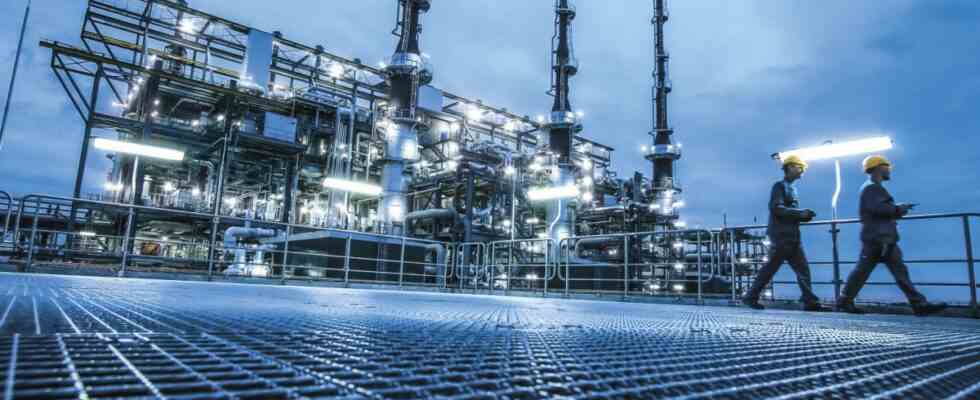It starts in a few days. Then Chancellor Olaf Scholz (SPD) travels to China, and BASF CEO Martin Brudermüller goes with him. The German chemical group is currently building a Verbund site in the south of the People’s Republic for around ten billion dollars. Brudermüller was there in September. The dynamic and the positive attitude of the people there are unbroken, says the manager: “They are busy and quick to implement and innovative.”
He lived there for ten years, said Brudermüller in a conference call, audibly annoyed by “China bashing”. There have always been “bumpy” times. Don’t worry about the long-term development. You weigh risks, don’t be “blue-eyed”. Overall, they came to the conclusion that China is an “opportunity” for BASF. “Half of the market is there. You have to ask yourself what the risk is for a company if it gives up half of the brand.” BASF wants to further expand its commitment.
In the group’s business, Brudermüller sees a continuing “strong headwind” from high prices for raw materials and energy and a weaker economy. For the first nine months of 2022, he put the additional costs for natural gas at the European sites at 2.2 billion euros compared to 2021. BASF has reduced the production of ammonia, for example, because it is cheaper to use the raw material for the production of fertilizer in to shop in other regions. BASF also expects higher natural gas prices in Europe in the medium and long term.
Although sales in the third quarter rose by almost twelve percent to around 22 billion euros. However, earnings before interest and taxes were a good half a billion below the previous year’s figure at almost 1.3 billion euros. BASF had to adjust the value of its stake in the oil and gas group Wintershall Dea by 740 million euros. Nothing comes of an IPO anytime soon. An IPO is currently “extremely difficult” due to the “Russian assets”, said CFO Hans-Ulrich Engel. BASF holds 67 percent of Wintershall Dea, the rest is owned by Russian entrepreneur Mikhail Fridman’s investment firm Letter One. According to Engel, the investment is in BASF’s books at ten billion euros, around half of which is attributable to Russian activities.
In Germany, BASF even posted losses in the third quarter. This year and next, the group wants to implement an austerity program that should save half a billion euros a year from 2025, says Brudermüller: “We can’t stick our heads in the sand and hope that this difficult situation will resolve itself in vanishes.”
Last week, Brudermüller’s contract was extended by a year until the end of the 2024 Annual General Meeting. During his tenure, the BASF share price has fallen sharply to currently around 47 euros. “That has less to do with his person and more to do with his environment,” says Arne Rautenberg from the fund company Union Investment: “One crisis followed the next.” Low water in the Rhine, the pandemic, tensions between the USA and China, ruptures in the supply chain, Russia’s war of aggression against Ukraine and the resulting higher energy prices.
A few big boards in the future
In the next two or three years, BASF has a few big problems to drill through, for example in the area of sustainability. “The share price depends on how sustainable BASF becomes in the next few years,” says Rautenberg. Brudermüller wants to make the group climate-neutral by 2050. “I believe him,” says Rautenberg: “He’s fully behind this goal.” This includes the electrification of the steam crackers at the Ludwigshafen site. The plant supplies the basic materials for many products. The justification for this association depends on the conversion of the Ludwigshafen site to renewable energies, says Rautenberg. If it is not possible to electrify the Verbund with renewables, sooner or later it could be more advantageous for BASF to buy basic chemicals such as polypropylene where energy costs are lower, for example in the USA.
Another big board is China. “The country’s risk profile has changed in recent months,” says Rautenberg. He’s not the only one who sees it that way. “The geopolitical risks have increased massively. This means that the capital market is taking a critical look at a long-term China strategy,” agrees Ingo Speich, an expert at the fund company Deka. The management of BASF must therefore question the very high level of dependence on China and keep this in mind in every decision. According to Union Investment’s Rautenberg, China as a location will probably not have a positive effect on BASF’s share price in the next few years.
The rating agency Moody’s currently rates BASF stable at A3. The rating reflects a broadly diversified product portfolio and the global positioning of the group. BASF is facing “major challenges” and has initiated a number of steps to address them. Analyst Moritz Melsbach does not see an immediate danger for the rating. But he sees a number of factors that could lead to “negative pressure” on the rating: longer-term higher prices for energy and natural gas in Europe and high investments in China. According to Melsbach, they occur at a time when Moody’s expects weaker demand for basic products. This has a negative effect on the liquid funds from the operative business. At the same time, Wintershall Dea’s IPO as a potential source of financing for these investments “will not be available for the foreseeable future”, and Wintershall Dea’s dividends can only partially compensate for this.
Speculations about Brudermüller’s successor have long since begun. Three names keep coming up: Saori Dubourg, Melanie Maas-Brunner and Markus Kamieth. They still have a few months to make their mark.

